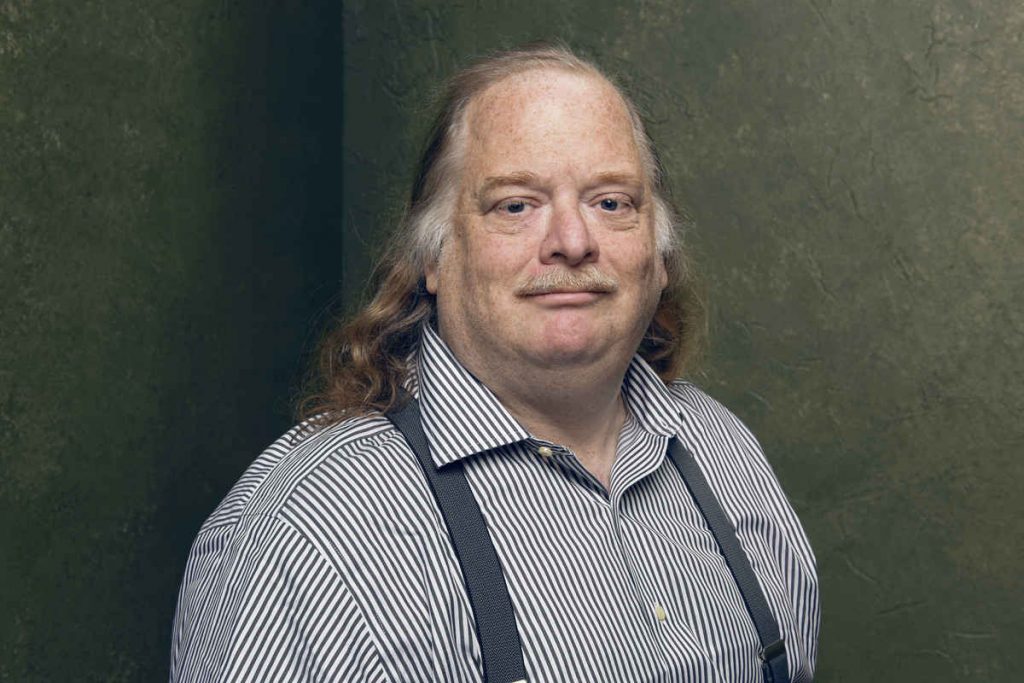Jonathan Gold, the city’s beloved Pulitzer Prize-winning food writer, died July 21. The cause was pancreatic cancer that had been diagnosed only weeks before. Gold, 57, was most recently the restaurant critic for the Los Angeles Times.
But he was way more than a food critic. He was an LA treasure: erudite, articulate, eccentric, endlessly curious, warm. A lover of the city in which he was born, raised and lived his life. A champion of the little guy and also, eventually, a reviewer of the world’s highest-end, most cutting-edge restaurants.
He did both with verve, aplomb and staggering intelligence.
Famously, for a while when he was in his early 20s, Gold “had only one clearly articulated ambition: to eat at least once at every restaurant on Pico Boulevard.”
Pico is not, at first glance, one of LA’s most promising or well-known thoroughfares, but that he managed to mine its riches and discover a universe in the process was exactly the point.
“Pico, in a certain sense,” he observed of the experience, “was where I learned to eat. I also saw my first punk-rock show on Pico, was shot at, fell in love, bowled a 164, witnessed a knife fight, took cello lessons, raised chickens, ate Oki Dogs and heard X, Ice Cube, Hole and Willie Dixon perform (though not together) on Pico.”
Way back in the early 1990s when I moved to the city myself, he taught me I could make the city my own by loving its food, its neighborhoods, its people.
He made living here an adventure and an exploration. His decency, fairness, sense of humor, meticulous research and consistently brilliant writing formed a kind of moral compass as to how to approach life and art.
He wrote a piece after the 1992 riots (we both lived in Koreatown at the time) that moved me to tears. He turned me on to Vim’s on 8th and Vermont (greasy-spoon Thai), Dow Shaw (which morphed into Heavy Noodling, which morphed into JTYH, now in Rosemead, with insanely delicious Shanxi knife-cut noodles), and Zankou Chicken’s mysteriously sublime garlic sauce.
Here’s how he described a food item called the beef roll:
“A steroidal composition of fried Chinese pancakes, cilantro and great fistfuls of thinly sliced meat wetted with sweet bean sauce and formed into something like a Chinese burrito the size of your arm. A specialty of Shandong, half a day’s drive north of Beijing, a proper beef roll may be big enough to feed a family of four but is also oddly delicate; it may taste of crisped pastry and clean oil but also projects the muscular minerality of the braised meat.”
The first time I went to Alhambra’s 101 Noodle Express, per Gold’s recommendation, my friend Ron and I each grabbed half a beef roll, gnawed off a huge bite, chewed.
Our eyes glazed over. A hush descended upon the table. Finally, one of us breathed, “Oh my God.” The other said, “You are kidding me, right?” Then we both said together, “That is the most delicious thing I have ever tasted.”
Though we’d never actually spoken, I felt I had a history with Gold.
I once attended an ALOUD event at the downtown library in which he took part. Afterward I approached the stage trembling, clasped my hands before my heart, like St. Thérèse of Lisieux appealing to Pope Leo XIII, “Please, please allow me to enter the cloister at Carmel at the age of 15!” and croaked, simply, “Thank you.”
Gold responded with as much grace as any human being under the circumstances could have been expected to. He replied, “Heh-hey, okay then,” and backed very, very slowly away.
In a culture of “open” relationships, he was a family man who had been married to editor Laurie Ochoa since 1990. Together they worked and moved from publication to publication — the LA Weekly, where they met, the LA Times, Gourmet — and he was notoriously devoted to her and their two kids.
In the land of the svelte, he was gloriously corpulent. In a food world trending vegan and gluten-free, he devoured meat, fat, pasta and bread with gusto. In the city of the $200 haircut, he wore his thinning strawberry-blond locks long and wispy.
“I’m pretty distinct looking,” allowed Gold, who was also over 6 feet tall. After he won the Pulitzer for food writing in 2015, the first (and to date the only) prize ever awarded in that category, he was even more recognizable.
The 2015 documentary “City of Gold” celebrates his life and work. “If I’m doing anything that’s beyond writing about food,” he said in one post-screening Q&A, “it’s to get people in Los Angeles to be a little less afraid of their neighbors.”
Then, firmly ensuring his place in the Cosmic Communion of Saints, he added, “I like immigrants. I think we should let just about anyone in.”
My heart stopped the night I read that he’d died. May his own heart continue to beat throughout his home of greater LA and beyond.

